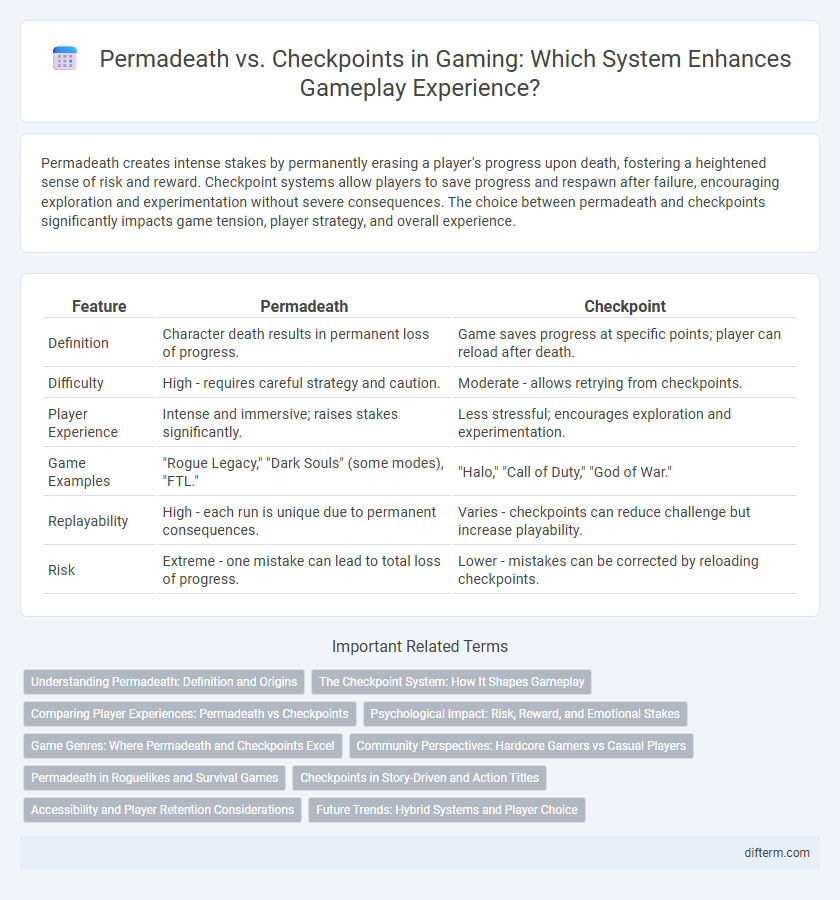Permadeath creates intense stakes by permanently erasing a player's progress upon death, fostering a heightened sense of risk and reward. Checkpoint systems allow players to save progress and respawn after failure, encouraging exploration and experimentation without severe consequences. The choice between permadeath and checkpoints significantly impacts game tension, player strategy, and overall experience.
Table of Comparison
| Feature | Permadeath | Checkpoint |
|---|---|---|
| Definition | Character death results in permanent loss of progress. | Game saves progress at specific points; player can reload after death. |
| Difficulty | High - requires careful strategy and caution. | Moderate - allows retrying from checkpoints. |
| Player Experience | Intense and immersive; raises stakes significantly. | Less stressful; encourages exploration and experimentation. |
| Game Examples | "Rogue Legacy," "Dark Souls" (some modes), "FTL." | "Halo," "Call of Duty," "God of War." |
| Replayability | High - each run is unique due to permanent consequences. | Varies - checkpoints can reduce challenge but increase playability. |
| Risk | Extreme - one mistake can lead to total loss of progress. | Lower - mistakes can be corrected by reloading checkpoints. |
Understanding Permadeath: Definition and Origins
Permadeath, or permanent death, is a game mechanic where a player's character is permanently lost upon defeat, requiring a fresh start from the beginning. Originating from roguelike games in the 1980s, permadeath emphasizes high stakes and player consequence, contrasting with checkpoint systems that allow respawn at saved progress points. This fundamental difference shapes gameplay intensity and player strategy, influencing modern game design across genres.
The Checkpoint System: How It Shapes Gameplay
The checkpoint system significantly influences gameplay by allowing players to resume progress after failure, reducing frustration and encouraging experimentation with strategies. This mechanic balances challenge and accessibility, creating a flow where players can learn from mistakes without severe penalties. By providing strategic save points, the checkpoint system fosters immersion and sustained engagement in gaming experiences.
Comparing Player Experiences: Permadeath vs Checkpoints
Permadeath in gaming intensifies player immersion by creating high stakes where one mistake leads to total loss, fostering careful decision-making and emotional investment. Checkpoints offer a more forgiving experience, allowing players to recover from failures without significant penalties, promoting exploration and experimentation. The choice between permadeath and checkpoints shapes game pacing and player engagement, influencing how risk and reward are balanced within gameplay.
Psychological Impact: Risk, Reward, and Emotional Stakes
Permadeath in gaming heightens psychological tension by introducing permanent consequences, increasing emotional investment and risk tolerance among players. Checkpoint systems mitigate stress by allowing progress retention, lowering perceived stakes and encouraging exploration without fear of loss. The dynamic between risk and reward shapes player motivation, influencing immersion and decision-making in game narratives.
Game Genres: Where Permadeath and Checkpoints Excel
Roguelike and survival games thrive on permadeath mechanics, enhancing tension and replayability by forcing players to restart upon failure, thus heightening strategic decision-making. In contrast, checkpoint systems dominate action-adventure and open-world genres, offering a balanced challenge while preserving player progress and narrative continuity. Tactical RPGs often blend both, using checkpoints for story arcs and permadeath for character consequences, maximizing engagement and emotional investment.
Community Perspectives: Hardcore Gamers vs Casual Players
Hardcore gamers often favor permadeath mechanics for the heightened tension and skill mastery it demands, viewing each decision as critical and irreversible, which enriches the gaming experience. Casual players typically prefer checkpoints, valuing the ability to progress without severe penalties to accommodate varied playtimes and reduce frustration. This divide highlights how player communities prioritize challenge and accessibility differently, shaping game design and replayability preferences.
Permadeath in Roguelikes and Survival Games
Permadeath in roguelikes and survival games intensifies gameplay by permanently removing characters upon death, forcing players to strategize carefully and adapt to unpredictable challenges. This mechanic enhances replayability and emotional investment as every decision carries significant consequences, heightening tension and immersion. Unlike checkpoint systems, permadeath emphasizes risk management and skill mastery, making success more rewarding in titles like "Dead Cells" and "Don't Starve.
Checkpoints in Story-Driven and Action Titles
Checkpoints in story-driven and action titles enhance player immersion by allowing seamless progression through narrative arcs and intense gameplay sequences without losing significant progress. By strategically placing checkpoints, developers maintain pacing and reduce frustration, encouraging exploration and risk-taking within the game's world. This system supports a balance between challenge and accessibility, ensuring players remain engaged and motivated to complete complex storylines and action-packed missions.
Accessibility and Player Retention Considerations
Permadeath in gaming presents a significant accessibility challenge by increasing difficulty and potentially discouraging players unfamiliar with high-risk mechanics, limiting player retention to only highly skilled or patient users. Checkpoint systems improve accessibility by offering frequent save points, allowing players to learn from mistakes without losing substantial progress and consequently maintaining longer engagement. Balancing permadeath and checkpoint designs can optimize player retention by accommodating diverse skill levels and enhancing overall game accessibility.
Future Trends: Hybrid Systems and Player Choice
Emerging gaming trends reveal a shift towards hybrid systems that combine permadeath intensity with checkpoint convenience, offering players flexible gameplay experiences. Advanced AI and procedural generation enable dynamic difficulty adjustments, blending permanent consequences with strategic respawn options. This evolution prioritizes player agency, catering to diverse preferences and enhancing long-term engagement in future game designs.
permadeath vs checkpoint Infographic

 difterm.com
difterm.com